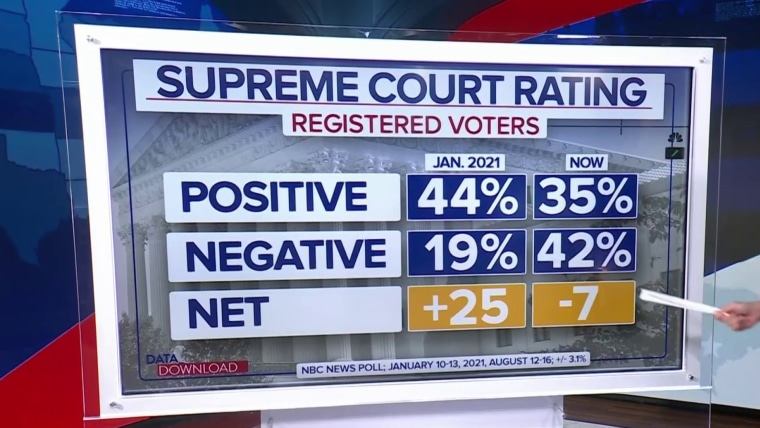Supreme Court temporarily blocks ruling that required Jewish university to recognize LGBTQ group
The Supreme Court on Friday temporarily allowed an Orthodox Jewish university in New York to deny official recognition to an LGBTQ student group, the latest in a series of decisions in favor of religious rights.
Justice Sonia Sotomayor in a brief order granted an emergency request made by Yeshiva University, which claims that recognizing the group would be contrary to its sincere religious beliefs. Sotomayor has responsibility for emergency applications arising from New York.
The dispute is the latest clash between religious rights and LGBTQ rights to reach the high court, which has a 6-3 conservative majority.

Supreme Court ratings plummet after SCOTUS abortion decision
AUG. 28, 202201:44
Friday’s decision puts on hold a decision by a New York state judge, who ruled in June that the university was bound by the New York City Human Rights Law, which bars discrimination based on sexual orientation. The university argues that it is a religious institution and therefore should be exempted from the law. Requiring it to endorse the group would be a “clear violation” of its rights under the U.S. Constitution’s First Amendment, which protects the free exercise of religion, the university argues. Sotomayor said the lower court ruling would remain on hold “pending further order” of the Supreme Court, suggesting the court could issue a more detailed order in the coming days.
“Yeshiva shouldn’t have been forced to go all the way to the Supreme Court to receive such a commonsense ruling in favor of its First Amendment rights. We are grateful that Justice Sotomayor stepped in to protect Yeshiva’s religious liberty in this case,” said Eric Baxter, a lawyer at the religious liberty legal advocacy group Becket, which is representing Yeshiva.
The Pride Alliance group, which first sought recognition in 2019, sued in April 2021, saying the university was required to grant its request because it is a place of public accommodation that is covered by the anti-discrimination law.
Katherine Rosenfeld, a lawyer for Pride Alliance, said Friday that the group “remains committed to creating a space space for LGBTQ students” on campus and would await final action from the Supreme Court.
Yeshiva, which describes itself in court papers as “a deeply religious Jewish university,” has said that officials concluded after consulting with Jewish religious scholars that an official LGBTQ club would be inconsistent with its religious values. The university was founded in 1897 for religious purposes and says it maintains that character even as it expanded its educational scope to include secular programs.
The New York City anti-discrimination law includes an exemption for religious organizations, but Manhattan-based Judge Lynn Kotler concluded that Yeshiva did not meet the relevant criteria.
Recommended

JOE BIDENBiden honors 9/11 victims, vows commitment to thwart terror

CONGRESSSenate grapples with election reform legislation as time runs short to act
Pride Alliance, joined by four individual plaintiffs, said in its response that the university’s request was premature and questioned whether there was an emergency that warranted Supreme Court intervention. All the university would be required to do if the judge’s order was allowed to go into effect is provide the group access to the same facilities that 87 other groups already receive, the group’s lawyers said.
Kotler’s ruling “does not touch the university’s well-established right to express to all students its sincerely held beliefs,” the lawyers said in court papers. They noted that a LGBTQ club has existed within the university’s law school for decades and that the university’s student bill of rights says that the New York human rights law applies to students.
Members of Pride Alliance have said that they are planning events backing LGBTQ rights for the coming weeks, including some timed around Jewish holidays.
The Supreme Court’s 6-3 conservative majority has strongly backed religious rights in recent cases, including several in its last term that ended in June. Among those rulings, the court ruled in favor of a high school football coach who led prayers on the field after games, sparking concerns from school officials that his actions could be viewed as government endorsement of religion as prohibited under the First Amendment.
The court, which legalized same-sex marriage in 2015, has also weighed several cases pitting LGBTQ rights against religious rights, ruling in 2021 in favor of a Catholic Church-affiliated agency that Philadelphia had barred from participating in its foster care services because the group refused to place children with same-sex couples. In 2018, the court ruled in favor of a conservative Christian baker in Colorado who refused to make a wedding cake for a same-sex couple.
Along similar lines, the justices are set to hear oral arguments this fall in a case involving a web designer from Colorado who wants the court to rule that, based on her evangelical Christian beliefs, she does not have to design wedding websites for same-sex couples. The court is currently on its summer recess, with the new term set to start in October.